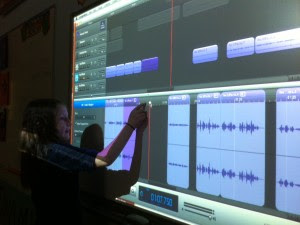Podcasting to Teach Foreign Language
As someone who enjoys learning foreign languages, I found the article Listening-Comprehension-Podcasting to be especially eye-catching. The article talks about how a second grade class was learning the story of Purim, and they recorded the story as a podcast, since they had previous experience with making podcasts. The children tell the story in Hebrew, but even if you don't speak or understand Hebrew, you can still hear how much fun the children had while recording the podcast. The most interesting part about this was that the students' lines were recorded out of order, and it was the students' job to put the sound clips in the correct order using a SmartBoard. Doing this allowed the children to really immerse themselves into the language. They had to listen to clips over and over as they sorted them into the correct order, and the repetition helps with comprehension and improves their fluency in the language. I never would have thought about using podcasts as a way to teach a foreign language, but now I can see just how beneficial it would be. Since I'm going to be a math teacher, if I could find a way to incorporate mathematics into making podcasts, it could be really beneficial for my students!
Benefits of a Worldwide Audience
The article A Worldwide Audience for Six Year Olds? discusses if and how having a global audience would affect a class of six year olds. The class recorded a podcast of them "interviewing" the two main characters of the book Vacation Under the Volcano by Mary Pope Osborne. After the children recorded the podcast, the teacher made a blog post about it, as well as a tweet, and encouraged people that listened to the podcast to leave comments with their geographical locations. When the teacher read the comments aloud to the class, the children were very excited and happy, especially at a comment that called them professional. The students made journal entries about the experience, and the comments shown in the article all express how happy the children were to have people from all over the world interested in their work.
I think their comments and reactions are enough to prove that having a worldwide audience matters to children. It not only excites them, but it motivates them! Being able to share your work with others around the world and getting positive feedback from them would greatly encourage you, wouldn't it? Children at that age are only really used to receiving feedback from their parents and teachers, so just imagine how it must feel to have someone from an entirely different country complimenting them on their hard work? This article really cemented how important it is to build a network of people from around the world. They can provide a view of your work that you may not have been able to see before!
Producing a Podcast
The article Producing a Podcast talks about the more technical aspect of recording podcasts, and it lists helpful steps to planning and creating a podcast. First, it talks about deciding on the purpose or theme of the podcast. Second, it says to prepare your students for the podcast. Get them familiar with the technology being used to record and how to talk into the microphone so their voices are of the best possible quality. Next, it talks about teaching the students about the programs that will be used to edit the voice clips. And lastly, it lists what can be done for the actual recording. For example, it suggests that the introduction be a recording of the whole class. At the end of the article, it embedded five different podcasts to listen to as examples.
This article gave me some ideas for what I and my group can do for our podcast, for instance, doing the introduction as a group and then recording individual segments. The article also gave me ideas for what I can do in the future with my students. Perhaps I could record a podcast with my students about how to do simple math like addition or multiplication, or we could even do a podcast on learning times tables or basic mathematical principles that would be beneficial to younger students. Creating a podcast with my students would definitely be a refreshing and fun activity and hopefully get my students more excited about math!


I think all of the podcast videos were interesting. I think they are a great way to help parents help their children by having a video to look at about what the students are doing in the class. I enjoyed your post it was well written and I think you got a lot of information from the videos.
ReplyDeleteI am looking forward to listening to your podcast.
ReplyDeleteThorough, thoughtful, well done!